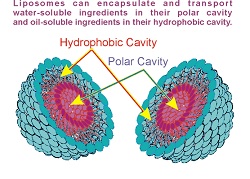 |
| Aradigm's liposomal technology for inhalation--Courtesy of Aradigm |
A team of scientists from Oregon State University (OSU) and Aradigm, a small pulmonary device company out of California, touted successful in vitro results for its inhaled, encapsulated ciproflaxacin treatment for lung infections.
The liposomal formulation, Lipoquin, is a vesicle made from lipids to encapsulate drugs, which are then slowly released in the lungs when they're inhaled. This sustained delivery keeps the treatment at the intended site without causing problems elsewhere in the body.
Ciproflaxacin is commonly used in oral and intravenous formulations as an antibiotic. Aradigm's Pulmaquin, on the other hand, is a dual-release formulation of both Lipoquin and free ciproflaxacin that can be delivered directly to the lungs to treat infections associated with cystic fibrosis, chronic obstructive pulmonary disease and alpha-1 antitrypsin deficiency. The company has brought it through a Phase IIb study and plans to begin a Phase III trial in the first half of this year. Aradigm also received orphan status for Pulmaquin in the U.S.
Aradigm's liposomal ciproflaxacin demonstrated in vitro to decrease 99% of infections in macrophages at a high concentration of 200 mcg/ml over four days, according to a company release. At a smaller concentration of 20 mcg/ml, the treatment still showed a 70% decrease of Mycobacterium avium and 90% decrease of Mycobacterium abscessus. Comparatively, unencapsulated ciproflaxacin did not show a significant decrease of either infection.
"These results are very encouraging as the current treatments are not particularly effective and have many side effects," said lead researcher Luiz Bermudez from OSU. "The airway delivery of ciproflaxacin in a vehicle that shows capability of killing specific mycobacteria harbored in macrophages and biofilms may be a promising way to help patients with these debilitating chronic infections."
The team will present the data in May at the American Thoracic Society's 2014 International Conference.
- here's the release